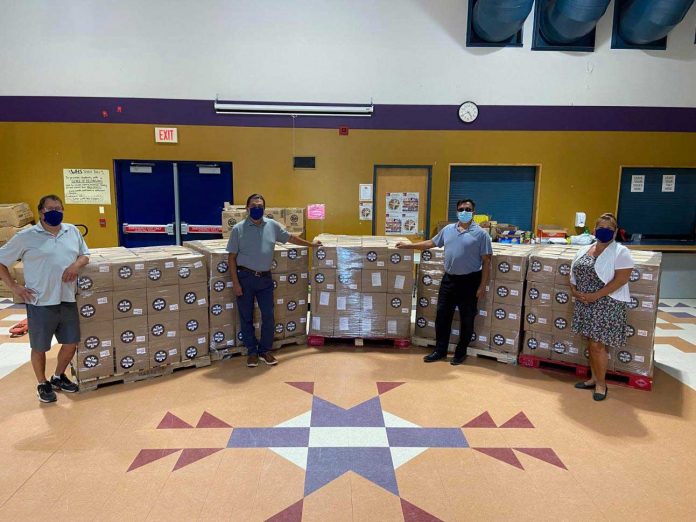LITTLE CURRENT – Federal Conservative Party leadership candidate Peter MacKay visited Manitoulin Island last Wednesday to meet with voting party members and win their support ahead of its internal leadership race taking place this month.
Mr. MacKay’s competition for Conservative Party of Canada leader includes Erin O’Toole, Leslyn Lewis and Derek Sloan. The cut-off date for mail-in ballots from Conservative members is August 21.
The Expositor spoke with Mr. MacKay after his main remarks at the August 5 Little Current gathering to learn more about his bid for the leader’s seat. He said despite the restrictions brought on by COVID-19, his campaign team has been finding new, effective ways to reach greater numbers of people.
If elected as party leader, Mr. MacKay acknowledged it will be difficult but crucial to reunite the fractured elements of the Conservative party under one brand. This has been visible in renewed prominence of both Quebec and prairie separatist views, a social conservatism faction under Maxime Bernier’s People’s Party of Canada and between the four candidates themselves and their approaches to conservativism.
“Conservatives tend to be very individualistic in their thoughts and have vigorous debates,” he said. “But we’ve got to stay together as a party if we’re going to stay together as a country.”
Key to a Conservative victory, he said, would be making inroads toward urban centres which have historically tended to lean more left. He said the Tories need to show that they are modern in thought, able to take on issues such as housing costs and create new jobs in the technology sector especially.
Capitalizing on Canada’s natural resources and exporting them to new markets such as India, Pakistan and the Asia-Pacific region would be key to economic prosperity, as well as forging new free trade agreements with nations like Great Britain.
When asked about what steps he may take to address the unemployment rate in Northern Ontario specifically, Mr. MacKay said the focus on resource extraction and improving broadband access would enable more opportunities for all of Canada, including the North.
“One silver lining of COVID-19 is it’s highlighted the need for internet both for human connections, but also for commerce, telehealth and mental health services. We need to have that capacity to connect—and it can’t be Huawei,” he said, adding that technology would shrink the urban/rural divide.
Mr. MacKay said more domestic manufacturing would be key, especially given the struggles during the pandemic with not being able to import enough personal protective equipment from Chinese factories. He also criticized the railway blockades from earlier this year that began in solidarity with Wet’suwet’en hereditary chief opposition to a natural gas pipeline and to advocate for the recognition of their inherent self-governance.
“We need to increase our reputation because people think they can’t build physical infrastructure in Canada,” he said, adding that providing clean water for all peoples was an attainable goal.
On the subject of electoral reform, Mr. MacKay said there were much higher priorities that needed to be addressed first before he would consider that.
He did not rule out exploring a universal basic income, which had been tested in Northwestern Ontario before the provincial Progressive Conservative government ended the pilot early before researchers could gather sufficient data on its efficacy. However, he said now would not be a good time for such a program.
“The basic economics of that are predicated on the economy firing on all cylinders. We’re just not there right now. I’d far rather take people off the tax rolls altogether,” the candidate said.
This would involve an increase to the basic personal amount tax exemption, though he declined to give a figure of what dollar amount should be exempt.
Mr. MacKay added that shrinking the massive deficit after COVID-19 recovery measures would be a crucial next step, saying that “socialism was the biggest failure of the 20th century.”
Notably absent from the gathering were any sitting elected officials, both from municipalities and from the district’s seven First Nations. Mr. MacKay said he believed there was an equal desire for all Canadians and Indigenous peoples to pursue projects in partnerships, such as energy projects that have been supported by First Peoples in Canada.
“I believe in the spirit of equal opportunity and respect. We need to strive to find partnerships and opportunities,” he said, adding that Conservative governments have done work to resolve land claims and passed legislation expanding the property rights of women in reserves.
He said the government needs to address the findings of the Missing and Murdered Indigenous Women and Girls inquiry with concrete actions and he extoled the virtues of public/private sector partnerships on projects beyond the government’s abilities.
As for his reluctance to impose a luxury tax or increase taxation for the wealthiest Canadians, Mr. MacKay said individuals and businesses will simply find other parts of the world where they are less taxed, hindering the capacity for innovation in Canada.
He said he was hoping that party voters would choose him for the leadership spot because of his nearly two decades of parliamentary experience and especially his hand in navigating through the 2008 global recession.
Conservative party membership holders will send in votes for their preferred party leader by later this month and the process will determine who will vie for the prime minister’s seat when the next federal election takes place.




